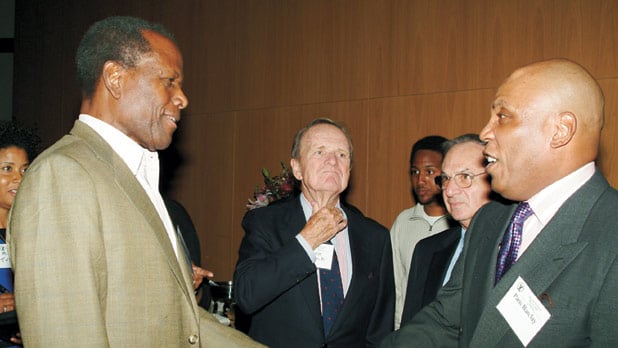A panel discussion and screening of the second half of director George Stevens, Jr.'s Separate but Equal, a 1991 telefilm about the landmark 1954 U.S. Supreme Court Brown vs. Board of Education decision to desegregate American schools, was orchestrated on May 26 by the DGA's Movies for Television Committee. The Committee was celebrating 40 years of TV's feature-length specialty, a form in which the themes and interpretations, directing and acting, often rival their more famous counterparts on the big screen. Coincidentally, the anniversary corresponded to the 50th anniversary of the Brown case.
The twin anniversaries made for a heady combination. "Television is a place where directors can take chances," remarked panel moderator and Committee Chair Robert Markowitz, a veteran of 30 made-for-TV or cable movies. "Separate but Equal is a lesson in writing, directing, acting and history.
Sidney Poitier, also a DGA director member, starred in the film as Thurgood Marshall, the NAACP lawyer who successfully argued the Brown case and later himself famously served on the Supreme Court. Poitier attended the screening and discussion, and was met with a standing ovation after being introduced in DGA Third Vice President Paris Barclay's welcoming remarks.
Director George Stevens, Jr. told of first contemplating the movie as a feature film. But feature studios had in the last two decades shied away from pieces such as Separate but Equal, saying that the script contained epic, but human-level events, and quietly conveyed emotions from a dozen people, including the lawyers of both sides and the Supreme Court justices, who understood the historical import of their actions. Therefore, the movie for television became the perfect venue to tell this story.
Panelist Joseph H. Duff, the prominent civil rights attorney, recalled the history, that at first, mostly un-enforced Brown edicts reverberated to help initiate other such historic flashpoints of African-American equality; strides made at Little Rock, Montgomery, Birmingham and elsewhere.
"It took a lot of serendipity for this to happen," Stevens said of the difficulty in making this film, but the pieces fell into place. "We contacted Justice Marshall. Sidney Poitier agreed to be in it, General Motors agreed to pay for it and ABC decided to broadcast it."






